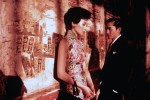A weary traveler wanders the desolate countryside, clutching his suitcase. The haunting narration of a torn and tortured woman reveals her feelings for a lost love, her distant memories and her hidden melancholy.
So begins the 1948 production “Spring in a Small Town,” director Fei Mu’s film about a love triangle among a sickly man, his wife and her past lover. The film is one of many screening at the Hammer Museum’s Billy Wilder Theater as part of “A Century of Chinese Cinema,” a series presented by the UCLA Film & Television Archive until Dec. 13.
Taking a signature plot from Chinese cinema’s golden age, but infusing it with innovative, fluid camera work and nonlinear narration, “Spring in a Small Town” has been hailed as one of China’s greatest and most influential films. Outside of its native country, however, most audiences have never even heard of it.
“We were interested in securing the rare prints … in order to present them to an American audience before they were sent back to China,” said Shannon Kelley, head of public programs at the UCLA Film & Television Archive. “Many of these films have rarely been screened in the States.”
A condensed version of a series that premiered earlier this year at the Toronto International Film Festival, “A Century of Chinese Cinema” features prints from the China Film Archive in Beijing, the Hong Kong Film Archive and the Chinese Taipei Film Archive, resulting in a program of 28 films that highlights important works from mainland China, Hong Kong and Taiwan.
Robert Chi, associate professor of Chinese cinema and assistant professor of Asian languages and cultures, said that because the films come from these three different areas, the program features different viewpoints for many of the same situations.
“The variation in perspective between films coming from these distinct regions is very much apparent in the way subject matter is handled,” Chi said. “For example, the role of the Chinese people in the war films being shown, in regard to who are the good guys and who are the bad guys.”
From popular costume dramas of the 1930s to the more recent atmospheric and ethereal romantic melodramas of director Wong Kar-Wai, the selections chosen for the retrospective showcase a diverse range of cinematic voices that have emerged from the Chinese film industry in the past 100 years. The featured films explore a multitude of perspectives, contextualized by political strife, drastic social revolution and many other factors that have shaped China throughout the 20th century and into the new millennium.
Often at risk of censorship by the government, many Chinese filmmakers have struggled to get their films into theaters.
“There’s a two-tier system in film production in China,” Chi said. “You must get a license to shoot the film based on the script, and then a license to exhibit the film once it has been made. As a result, there are a lot more chances for things to go wrong, for things to be censored.”
Cecile Tang Shu Shuen, a filmmaker from Hong Kong, has experienced such stringent censorship. Though hailed as one of the greatest Chinese directors of the 1970s, several of her movies were censored and even banned in her native country because of the political implications found in much of her work. With the “A Century of Chinese Cinema” series at the Billy Wilder Theater, however, two of her most critically acclaimed features – 1970’s “The Arch” and 1974’s “China Behind,” both playing on Nov. 22 – will finally be made available once more to a paying public.
Other films featured during the program’s run have been influential in their respective genres but have been largely ignored outside of China.
Director Patrick Lung Kong’s 1967 stylized crime picture “The Story of a Discharged Prisoner,” playing Dec. 6, heavily influenced the operatic Hong Kong action cinema of the 1980s, particularly the films of John Woo. Yet outside of China, the movie – a story of violent outcasts on the margins of society – has rarely been screened.
The retrospective culminates in a selection of more modern art house works. 1989’s “A City of Sadness,” playing Dec. 8, Hou Hsiao-Hsien’s portrait of a family living amid the violence of Taiwan’s Kuomintang government, and Wong Kar-Wai’s “In the Mood for Love,” playing Dec. 13, focusing on the story of a destructive love affair, have become some of the most popular movies to come out of Asia in the past three decades.
David Parsons, a resident of Los Angeles, has attended several past screenings of the two-month-long series.
“Before going to some of the films UCLA has been screening for this, my knowledge of Chinese film was minimal at best,” Parsons said. “This festival has really opened my eyes to some masterpieces I had never before heard of, and probably would have never heard of.”
